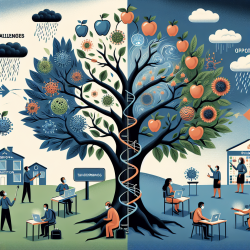Introduction
In the ever-evolving landscape of education, particularly special education, adapting to new challenges is a constant. The recent research article, "Barriers to and facilitators of populational adherence to prevention and control measures of COVID-19 and other respiratory infectious diseases: a qualitative evidence synthesis," provides valuable insights that can be applied to improve adherence to prevention measures in educational settings. This blog explores how special education practitioners can leverage these findings to enhance their skills and ensure a safe learning environment for all students.
Understanding Barriers and Facilitators
The research identifies 37 barriers and 23 facilitators to adherence to prevention and control measures for COVID-19 and other respiratory diseases. Key barriers include misinformation, financial insecurity, and lack of trust in authorities. Conversely, facilitators include assertive communication, financial and social support, and trust in health professionals.
For special education practitioners, understanding these factors is crucial. Students with special needs often require tailored approaches, and recognizing these barriers and facilitators can help in designing effective strategies to ensure compliance with health measures.
Implementing Research Outcomes
Here are some actionable steps for practitioners:
- Enhance Communication: Use clear, consistent, and assertive communication to convey the importance of preventive measures. Tailor messages to the comprehension levels of students and parents.
- Build Trust: Establish trust with students and parents by being transparent about health measures and their benefits. Engage health professionals to provide credible information.
- Provide Support: Address financial and social barriers by connecting families with resources and support systems. Consider partnerships with organizations like TinyEYE to provide accessible online therapy services.
- Combat Misinformation: Educate students and parents about the dangers of misinformation. Provide access to reliable sources and encourage critical thinking.
Encouraging Further Research
While the research provides a robust framework, there is always room for further exploration. Practitioners are encouraged to engage in ongoing research and professional development to stay informed about emerging trends and best practices. Attending conferences, webinars, and networking events can provide valuable opportunities for learning and collaboration.
Conclusion
By embracing the findings of this research, special education practitioners can transform challenges into opportunities. Implementing effective strategies to overcome barriers and leverage facilitators will not only enhance adherence to health measures but also create a safer and more supportive learning environment for students with special needs.
To read the original research paper, please follow this link: Barriers to and facilitators of populational adherence to prevention and control measures of COVID-19 and other respiratory infectious diseases: a qualitative evidence synthesis.










